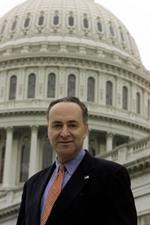

SCHUMER RELEASES EVIDENCE THAT WAIT TIMES AT THE PEACE BRIDGE HAVE INCREASED IN 2013 – SENATOR WILL FIGHT FOR MORE CUSTOMS & BORDER PROTECTION FUNDING IN APPROPRIATIONS PROCESS
After Schumer’s Urging, CBP Has Released Data on Wait Times At the Peace Bridge - In FY 2013, Peak Average Wait Times For Commercial Vehicles Have Jumped From 21 Minutes to 29 Minutes, & From 18 Minutes to 26 Minutes For Passenger Vehicles
In The Upcoming FY2014 Appropriations Process, Schumer Will Fight for a Boost in Customs & Border Protection Funding to Put More Agents To Work at Our Border Crossings, Like the Peace Bridge
Schumer: There’s No Longer Any Doubt That Wait Times At The Peace Bridge Are Up, Now We Need More Agents on the Job To Speed Things Up
Last week, U.S. Senator Charles E. Schumer released evidence that wait times at the Peace Bridge increased in Fiscal Year 2013, and in turn launched his push to boost funding for the Customs and Border Protection (CBP) in the upcoming Senate Appropriations Bill. In the beginning of December, Schumer stood at the Peace Bridge and fought for the federal government to address reported wait time increases at the crossing, and called on the CBP to provide information related to those increases. The CBP has since released the following information to Schumer:
· NYS Average Peak Wait Times:
o Commercial Vehicles = 29.4 minutes in FY13, up from 21.2 minutes in FY12
o Passenger Vehicles = 26.4 minutes in FY13, up from 17.9 minutes in FY12
· NYS Average Wait Times:
o Commercial Vehicles = 6.2 minutes in FY13, up from 3.2 minutes in FY12
o Passenger Vehicles = 5.9 minutes in FY13, up from 3.1 minutes in FY12
In response, Schumer will urge his colleagues to boost funding for the Customs and Border Protection in the Fiscal Year 2014 Appropriations bill, above the current 2013 levels. The appropriations bill is currently being negotiated. Schumer said that an increase in funding for next year would allow CBP to sustain its 21,775 officers that currently work at our 329 ports of entry and would allow over one-thousand new officers to be hired. If this increased funding is secured, Schumer will then fight for more of those officers to be stationed at the Peace Bridge.
“Too often travelers are pulling up to the Peace Bridge, sitting in long lines and finding that only half the lanes are open, evidenced by CBP’s new data that show increased wait times since last year. I continue to urge the CBP to boost the number of agents working at the Peace Bridge to help relieve congestion and improve travel times, and will also fight to increase funding to help them do so in the upcoming Appropriations bill. These backups cause headaches and are a drag on the economy, and we need more agents ushering travelers, sports fans, shoppers and commercial vehicles into Western New York, not less.”
On December 2nd, Schumer stood at the Frank Lloyd Wright's Fontana Boathouse in Buffalo and called on the Customs and Border Protection (CBP) Agency to explain why recent lane closures have become more frequent, and urged the agency to boost border agents at the Bridge. According to local border and Peace Bridge Authority officials at the time, cutbacks in border agents have been significant and wait times and lane closures have increased. Some estimated that as many as 60 agents have been cut from the Buffalo Border in the past 18 months. Schumer said today that CBP has since released evidence to prove that these increased backups have occurred. Schumer is urging CBP to move more agents to the border now, and he is fighting to boost future funding for the program.
Schumer said that an understaffed Buffalo border jeopardizes the potential benefits of progress being made at the U.S. plaza and with commercial vehicle pre-inspection. These reductions have led to lane closures and backups that are not only frustrating, but hurt the local economy. According to the University of Southern California’s National Center for Risk and Economic Analysis of Terrorism Events (CREATE) April 2013 report, for every additional agent at a US Port of Entry the local economy sees a $2 million boost and 33 new jobs – a statistic that CBP cites regularly. Schumer explained that this counterproductive reduction in CBP agents in Buffalo is not only unjustifiable given the increased traffic and wait times it has caused, but the negative impact on the Western New York economy with each reduction makes it unacceptable.
